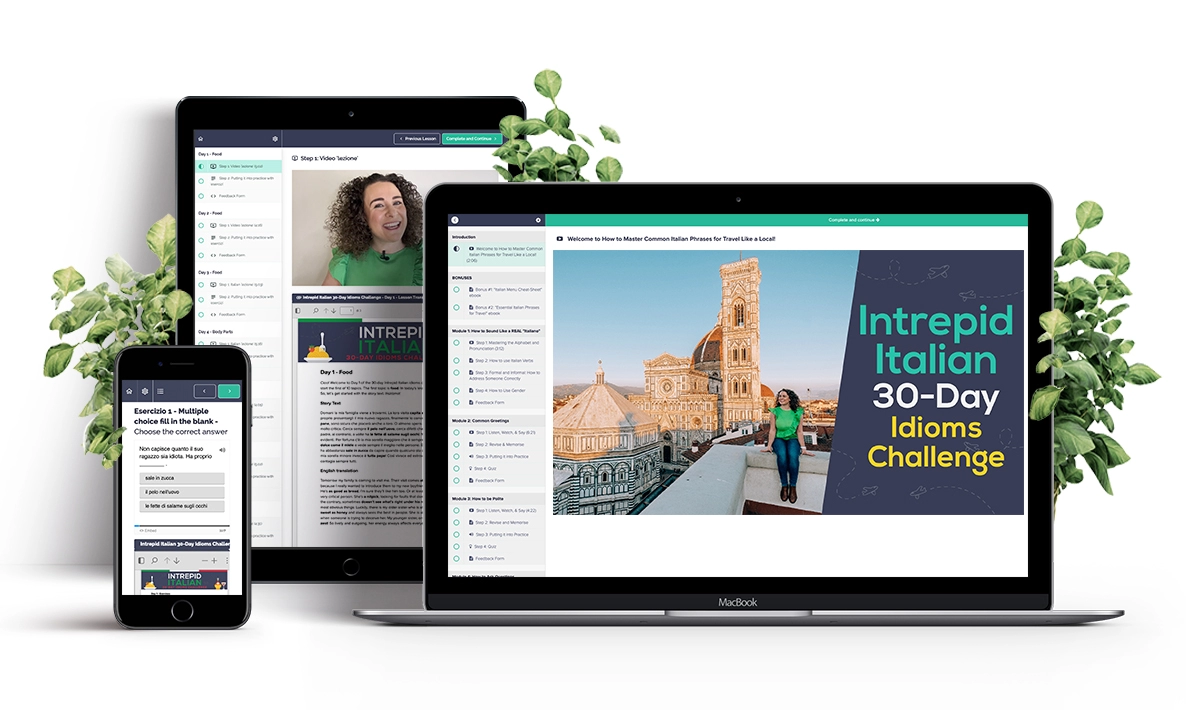What should you do if someone wants to attaccare bottone?
What are you doing if you fare le ore piccole?
Is it a good thing if something happens: a fagiolo?
Do you feel limited by your textbook Italian vocabulary? Are you sick of using the same old basic Italian words over and over again? Then you need to pick up some Italian slang and learn Italian idioms. Idioms are the secret-sauce to sounding natural in Italian!
Native Italians pepper all sorts of idioms throughout their everyday conversations. So, mastering a wide variety of idioms is your secret weapon that will take you miles closer to fluency.
In this guide, we’re going to look at 22 of the most popular Italian idioms and expressions that will make you sound like a native Italian speaker. From idioms that use food, body parts, animals and colours as metaphors, you’ll finally be able to express yourself like a native in all areas of your life.
To continue your learning and help you practice all these Italian idioms, make sure you download your free PDF cheat sheet using the form below.
1. A fagiolo
The first Italian idioms is: a fagiolo (pronounced: ah fah-joh-loh). This literally means ‘to the bean’ and indicates that something is ‘just right’. You probably remember the idiom capita a fagiolo (‘it happens at the bean’) in the Intrepid Italian 30-day Idioms Challenge. This idiom describes something, like an unforeseen situation, that occurs at an ideal or opportune moment.
- La loro visita capita a fagiolo perché volevo proprio presentargli il mio nuovo ragazzo. – Their visit comes at just the right time because I really wanted to introduce them to my new boyfriend
2. Minestra riscaldata
While it has the literal meaning of ‘reheated soup’, it also has the figurative meaning of ‘same old story’. It is used to describe a past situation, like a relationship, which one wants to relive but which no longer has the value it once had. In English, we say, ‘to be the same old story’.
- Il film sembrava una minestra riscaldata dal punto di vista narrativo. – The movie seemed like reheated soup from a narrative point of view.
3. Essere alla frutta
Essere alla frutta means to be morally or physically exhausted or desperate. Since a meal usually ends with dessert and fruit, if someone ‘è alla frutta’, he/she is without energy or strength left. In English, we say ‘to hit rock-bottom’ or ‘to be at the bottom of the barrel’.
- Oggi è stata una giornata molto stressante al lavoro, sono alla frutta. – Today was a very stressful day at work; I am at the bottom of the barrel.
Want to Learn 200+ Fluency Boosting Italian Idioms?
Are you enjoying learning these Italian idioms? Are you serious about learning Italian? Imagine how you would feel if you were to absorb 200 more fluency-boosting Italian idioms naturally, so you can use them instinctively and confidently slip them into your spoken Italian. Well, now you can! Introducing my Intrepid Italian 30-Day Idioms Challenge. Reach fluency faster with my daily video lesson and quizzes. To find out more, click here.
4. Avere / far venire l’acquolina in bocca
Avere (to have) or far venire (to make/cause) l’acquolina in bocca (literally, ‘the little water in mouth’), means ‘to make one’s mouth water’ at the sight or smell of something delicious. In English, we say ‘whet your appetite’ or ‘my mouth is watering’.
- Solo guardando il menù mi è venuta l’acquolina in bocca. – Just looking at the menu made my mouth water.
5. Spina nel fianco
The next Italian idiom is (essere) una spina nel fianco (literally ‘to be a thorn in the hip’), which describes a person or thing that is capable of causing trouble, harm, danger or damage to someone or something. In English, we say ‘thorn in one’s side’.
- Miriam è una vera spina nel fianco. – Miriam is a real thorn in my side.
6. (Essere) una/la pecora nera
The next idiom is (essere) una/la pecora nera, literally ‘(to be) a/the black sheep’. Like in English, ‘to be the black sheep’, means to be an outsider, to be in a situation where you don’t belong. This idiom is frequently used in the context of family, indicating the person who swims against the tide, breaking rules handed down from generation to generation by making ‘transgressive’ choices.
- E io sono sempre stato la pecora nera della classe. – I was always the black sheep of the class.
7. (Tenere) le dita incrociate (per qualcuno)
The next idiom is (tenere) le dita incrociate (per qualcuno), literally ‘to keep one’s fingers crossed (for somebody)’. This expression has Christian origins and evokes the cross. Nowadays it is used when wishing for something to go well. In English, we say ‘fingers crossed’.
- Dopodomani parto per Bali, dove prenderò la mia certificazione e completerò l’esame finale. Tenete le dita incrociate per me! – The day after tomorrow I leave for Bali, where I will take my certification and complete the final exam. Keep your fingers crossed for me!
8. L’abito non fa il monaco
Then next Italian idiom is l’abito non fa il monaco, literally ‘the dress does not make the monk’. It basically says that appearances are not what’s important because they may be deceptive. In English, we say: ‘don’t judge a book by its cover’.
- Dobbiamo smettere di paragonarci agli altri: prima di tutto perché l’abito non fa il monaco. – We must stop comparing ourselves to others: first of all because appearances are deceiving.
9. Fare una passeggiata
The next idiom is fare una passeggiata, literally ‘to do a walk/stroll’. It’s used as an alternative to the verb passeggiare and it means to go for a stroll/walk. It’s slightly different from camminare, which also refers to the act of walking but indicates a more intense physical activity, such as camminare in montagna (to hike). In English, we say ‘to take a walk’.
- Ti va di andare a fare una passeggiata insieme oggi pomeriggio? – Would you like to go for a walk together this afternoon?
10. Fare le ore piccole
fare le ore piccole, literally ‘to do the little hours’. ‘Le ore piccole’ refers to the earliest hours of the day (2 am, 3 am, 4 am, 5 am indicatively) and this expression means to stay out late without sleeping and come home in the morning. In English, we say: ‘to stay up/out late’.
- Sono stanchissimo. Ieri ho fatto le ore piccole. – I am so tired. Yesterday I stayed out late.
11. Fare una brutta figura / Fare una bella figura
Fare una brutta figura, literally ‘to do a bad figure’. It means to make a bad impression, a gaffe, or to make somebody look bad. The opposite is fare una bella figura, which means to make a good impression. In English, we say: ‘to make a bad impression’.
- Comunque sbrigati, facciamo una brutta figura se arriviamo tardi alla cena. Ha preparato le lasagne. – Anyway hurry up, we’ll look bad if we’re late for dinner. She made lasagna.
12. Non stare più nella pelle
literally ‘no longer be able to stay in one’s skin’. This idiom is used when you’re very excited about something. In English, we say: ‘to look forward to something’, ‘can’t wait for something’.
- Tra qualche mese infatti inizierò finalmente a lavorare in ospedale: non sto più nella pelle! – In a few months I will finally start working in a hospital: I can’t wait!
13. Avere la testa fra le nuvole
Avere la testa fra le nuvole, literally ‘to have the head between the clouds’. It means being naive, dreamy or distracted. It refers to people who cannot think logically and objectively and are caught up in other thoughts. In English, we say: ‘have your head in the clouds’.
- Negli ultimi giorni al lavoro non ero per niente concentrata: avevo la testa fra le nuvole. – In the last few days at work I wasn’t focused at all; my head was in the clouds. I kept thinking about the sea, the sun and the beaches!
14. Felice come una Pasqua
The next Italian idiom is felice come una Pasqua, literally ‘happy as an Easter’. Similar to the previous one, this idiom describes a very happy and joyful person. It is a saying derived from the Christian holiday of Easter. In English, we say: ‘happy as a clam’ or ‘happy as can be’.
- Non so descrivere a parole quello che provo, so solo che sono felice come una Pasqua. – I can’t describe in words how I feel, I just know that I’m happy as a clam.
15. (Il) principe azzurro
The next idiom is (il) principe azzurro, literally ‘light-blue prince’. This idiom is used to refer to the perfect man, whom every woman would want as a husband or boyfriend. It comes from the fact that princes are often depicted in fairy tales with a blue or light-blue cloak. In English, we say: ‘Prince Charming’.
- Anch’io spero un giorno di trovare il principe azzurro e di poter festeggiare così tanti anni di vita insieme. – I also hope someday to find Prince Charming and celebrate so many years together.
16. Sogni d’oro
Sogni d’oro, literally ‘golden dreams’. By wishing someone ‘golden dreams’ we are wishing them a pleasant night’s sleep. In English, we say: ‘sweet dreams’.
17. Vita grigia
The next Italian idiom is vita grigia, literally ‘gray life’. It means a sad, uncertain and monotonous life, as the color gray/grey is often associated with loss or depression. In English, we say: ‘grey/gray life’.
- Ho pensato: che vita grigia. Non è giusto! – I thought, what a gray life. It’s not fair!
18. Attaccare bottone
Literally ‘to attach button’. It means to establish a conversation with someone you don’t know, often with the purpose of flirting with them. In English, we say: ‘to chat up’, ‘to strike up a conversation’.
- Spero che sia lui ad attaccare bottone e ad iniziare la conversazione. – I hope he will be the one to strike up a conversation.
19. Fare la scarpetta
Fare la scarpetta, literally ‘to do the little shoe’. This super common Italian idiomatic expression means to scoop up the sauce left on the plate with a piece of bread. There is no direct English translation.
- Quando ho finito di mangiare ho fatto la scarpetta con il pane, perché il sugo è la parte più buona! – When I finished eating, I scooped up the sauce with the bread, because the sauce is the best part!
20. Prendersi / Avere una cotta
The next idiom is (prendersi) una cotta, literally ‘(to take oneself) a crush’. Prendersi or avere una cotta means to have a mild infatuation or feel a strong attraction to someone. In English, we say: ‘to have a crush on somebody’.
- Secondo me Roberto si è preso una cotta. – My guess is Roberto he has a crush.
21. Una ragazza acqua e sapone
Literally ‘a girl water and soap’. The expression describes a simple girl, who doesn’t wear makeup but only soap and water to wash her face. Hence the idea of simplicity, of not having airs, of not trying to look like something other than what she is. In English, we say: ‘clean-faced, pure-looking girl’ or ‘wholesome-looking girl’. There is also the expression (avere) una bellezza acqua e sapone, which means to have a natural beauty.
- Valentina è una ragazza acqua e sapone. – Valentina Is a wholesome-looking girl
22. Tempo da cani / Tempo da lupi
Then we have tempo da cani, literally ‘dog’s weather’. It means bad weather, usually very cold and with wind, rain, snow, thunderstorms and so on, which causes inconvenience and suffering that it was believed should only be endured by beasts, and especially dogs. An alternative is tempo da lupi (wolf’s weather). In English, we say: ‘horrible weather’.
- È abbastanza stressante visitare una città con questo tempo da cani. – It is quite stressful to visit a city in this horrible weather.
How to master Italian idioms and speak like a native
Do you sound like a robot when you speak Italian?
Do you feel frustrated that you can’t express the nuances of what you really think and feel?
I know what it’s like to feel like you’ve reached the limits of your vocabulary and sound repetitive saying the same old phrases when all you want to do is freely express yourself without feeling like an idiot.
Using my 80/20 method to pin-point the most expressive Italian idioms, this challenge will help you unlock and master over 200 everyday essential Italian idioms so you can express yourself with ease and sound Italiano.
- No more sounding robotic
- No more being limited by your vocabulary
- And most importantly… no more ‘basic” responses.
Registrations are now open to join the Intrepid Italian 30-Day Idioms Challenge. Absorb over 200 fluency-boosting Italian idioms naturally and reach fluency faster with daily lessons and quizzes. To find out more, click here.
Like it? Pin it for later!




